7 Eating Habits to Avoid Blood Sugar Spikes, Say Dietitians

When it comes to managing your blood sugar, you have a ton of factors to think about. According to the CDC, overeating, feeling stressed, and even getting sick can spike your glucose levels and lead to unwanted symptoms like fatigue and distorted vision. For many, exercise, medicine, and the right meal plans can keep these issues in check. And while exercise plans and pharmaceutical regimes can easily fall into place, keeping track of your meals and eating habits can prove a bit trickier.
The Mayo Clinic recommends your diet consists of seafood, fruits, and vegetables packed with fiber, and good fats while limiting many refined carbs. While this advice is easier said and done, you still need to manage exactly how you eat.
Luckily, we assembled the top positive eating habits to embrace when you need to avoid blood sugar spikes and avoid the nasty side effects that come with them. By incorporating these patterns into your own meal routine, you can keep glucose spikes to a minimum and feel that much more consistent. Then, for more meal inspiration, be sure to check out our list of the 22 Meals to Melt Belly Fat in 2022.
Start your meal with vegetables.
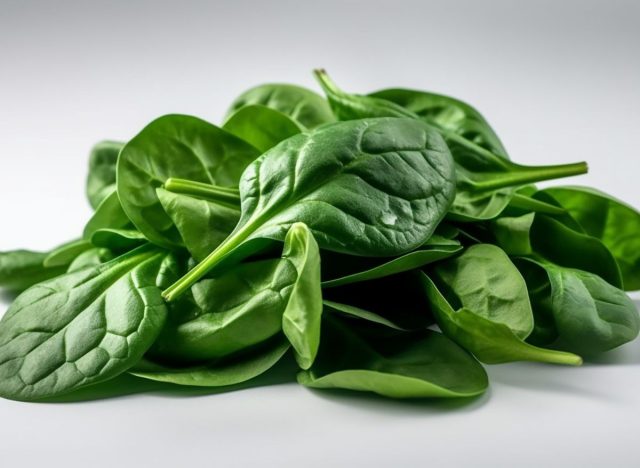
“One of the best ways to minimize blood sugar spikes is to start each meal with veggies—ideally leafy greens, cucumbers, zucchini, or other non-starchy veggies,” says Samantha Presicci, MCN, RD, LD, CPT at FOND Bone Broth. “From there, eat your protein, healthy fats, and then whatever carbs you’ve plated (rice, potatoes, etc). The fiber, followed by the fat and protein, helps blunt any blood sugar spike.”
If you need some inspiration for vegetables to get you started, you can’t go wrong with the 12 Surprising Vegetables That Become Healthier When They’re Cooked. Just make sure to select the options with the least amount of starch, and you can’t go wrong.
Pair carbs with fats.
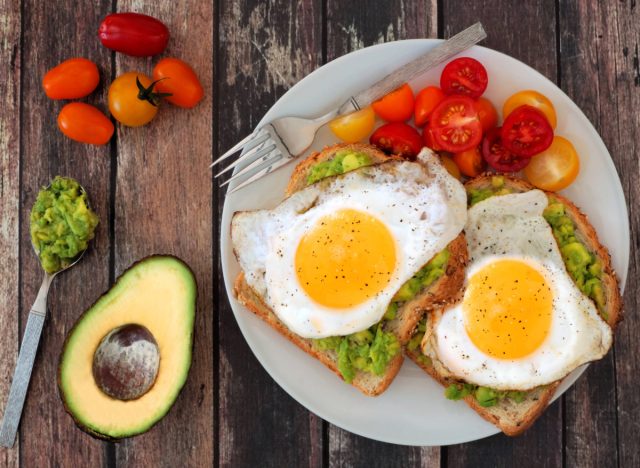
It might seem counterintuitive, but eating a serving of fat alongside carbohydrates can do wonders for your blood sugar.
“If you’re having a snack, always pair your carbs with fat or protein,” says Presicci. “For example, if you’re going to have an apple or some berries, pair that with a handful of nuts, some nut butter, full-fat cheese, full-fat yogurt, or another source of healthy fat or protein. Having a few bites of these protein and fat-rich foods before you eat the carbohydrate portion of your snack will result in less of a blood sugar spike because fat (and protein, to a lesser extent) digests more slowly than carbohydrates and rarely causes a blood sugar spike on its own.”
“It’s best to avoid eating naked carbs—carbs on their own without the inclusion of protein and fat,” Presicci continues. “If you’re looking to manage your blood sugar, a good rule of thumb is to stick with 1 to 2 servings of carbs per meal (30 grams or less) and to pair those carbs with adequate protein (30 plus grams) and healthy fat (1 to 3 servings).”
Sip on more bone broth.

If you want to diversify your meals, you can’t go wrong with adding a certain liquid component to your meals.
“Aside from veggies before the bulk of your meal, I also like recommending a blood sugar-balancing beverage, like bone broth,” says Presicci. “Bone broth has specific amino acids, like glycine and glutamine, that help balance blood sugar and nourish the digestive tract. Because it’s rich in protein, it can be a great blood sugar-balancing pairing for a meal or snack.”
Don’t assume you need to stress out all day in the kitchen to whip up this staple. Next time you hit the grocery store, keep an eye peeled for The Best & Worst Store-Bought Broth & Stock Brands and bring home the right broth for your tastes.
Eat a balanced diet.
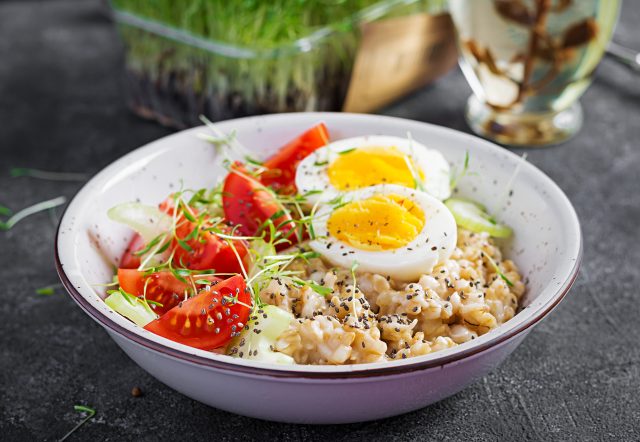
It might seem obvious, but eating a balanced meal can do wonders for your blood sugar.
“When it comes to dietary prevention of blood sugar spikes, it is best to eat a balanced meal or snack,” says Caitlin Carr, MS, RD. “Highly processed carbohydrates or ‘refined carbs’ cause blood sugar spikes. Does this mean we have to avoid those all the time? No. We need to eat carbohydrates (even refined ones) in balance with other nutrients. Pairing carbohydrates with fat, protein and fiber will slow the absorption of carbohydrates from a meal by increasing the variety of nutrients that our body absorbs and by extending that time of absorption and transfer to the blood. A variety of nutrients, absorbed over a longer period of time, will decrease the concentration of glucose headed to the bloodstream which prevents a blood sugar spike.”
“A dietary pattern focused on a variety of macronutrients and fiber is your best defense against blood sugar spikes,” Carr continues. “This may look like a Mediterranean diet or the DASH diet, or just trying your best to include a fruit or vegetable with each meal and a snack per day.”
Include more fiber in your diet.
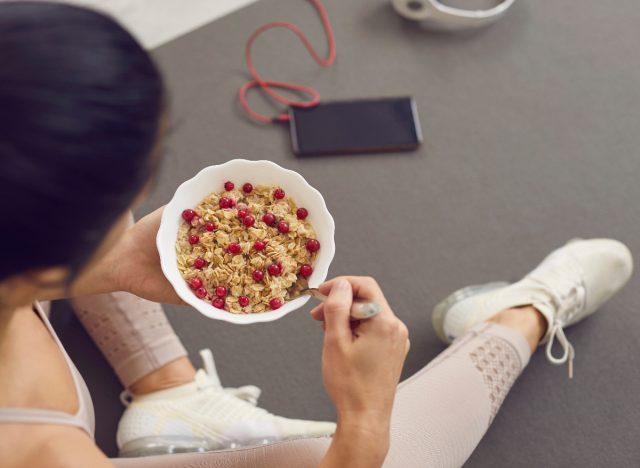
Getting an extra dose of fiber in your life couldn’t hurt and even leads to steady blood sugar levels.
“95% of Americans miss the mark on the recommended fiber intake of 14 grams per 1000 calories or roughly 25 to 38 grams per day,” says Lauren Harris-Pincus, MS, RDN, founder of NutritionStarringYOU.com and author of The Everything Easy Pre-Diabetes Cookbook. “Fiber, particularly soluble fiber, can help to manage blood sugar by forming a gel-like substance with water that delays the rate of digestion and absorption of carbohydrates. Two wonderful sources are oats and beans.”
Check your cupboards and pantry for the 43 Best High-Fiber Foods For a Healthy Diet and start including them more in your day-to-day meals.
Eat your meals earlier.
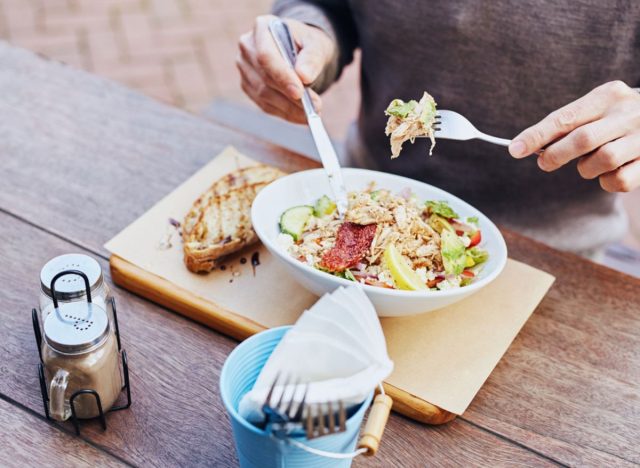
Eating meals earlier in the day can have a ton of positive health benefits, and anyone who needs to manage their glucose levels has one more reason to love eating an early dinner.
“Research shows that people who eat more of their total calories earlier in the day may have better blood sugar control than those who eat the same amount of calories with a larger percentage shifted later in the day,” says Harris-Pincus.
“Our bodies handle carbohydrates better earlier as well when we are active during daylight hours versus sitting on the couch at night when our digestive system slows in preparation for sleep,” she continues. “Try the old adage, ‘breakfast like a king, lunch like a prince and dinner like a pauper’ for better blood sugar control.”
Make your meal schedule consistent.
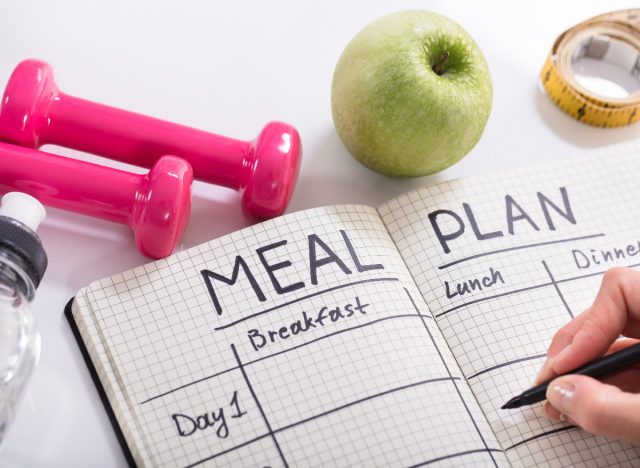
“Getting into the habit of being consistent is key for a person that has diabetes, the body reacts based on what was fed in the past, therefore it is vital that a person remain consistent with times, types of foods, and portion control,” says Blanca Garcia, RDN and Nutrition Specialist of Healthcanal. “Over time the body will be balanced and the typical long-term test known as Hgb A1c will show if there was consistency in sugar levels.”
Consistency is key when it comes to reducing blood sugar spikes. Once you master this habit, you can have a much grip over reducing blood sugar spikes and feel better throughout the day.
Now that you have these eating habits down, be sure to stock up on these Best Drinks to Lower Blood Sugar, Say Experts.









